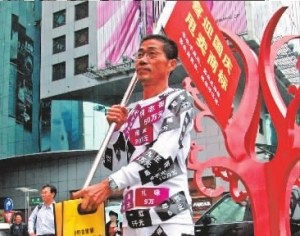There’s an old journalistic shorthand– “Man Bites Dog”— for the type of story that’s so strange, so out-of-the-ordinary, that it makes for great news.
Here’s a trademark story that fits the bill.
An entrepreneurial man in China dubbed the “Trademark Maniac” is trying to make money by registering trademarks, covering his body with stickers bearing the marks, and walking around public places in an attempt to (literally) sell you the trademark off his back.
Sound too weird to be true? I’ve got a source for this.
From the Chinese People’s Daily Online:
“A middle-aged man in a white long sleeve shirt was pasted with labels for a variety of trademarks from neck to heel and walked around Wuhan Plaza holding a red flag on the afternoon of Sept. 27.
The price labels read, “To celebrate the National Day holiday, trademarks are available at discount prices – ‘comrade brother’ is priced at 1 million yuan and ‘Li Xiang’ at 80,000 yuan.” […]
It is known that the man is Deng Jiulin with the nickname “Trademark Maniac.” He once spent more than 200,000 yuan to make rush registrations of more than 100 trademarks.”
Strange, yes. But this actually raises an interesting trademark question.
Let’s say you are persuaded by Mr. Jiulin, and you’d like to buy one of his trademarks. If you do so, what are you getting in exchange for your money? I’m not an expert on Chinese trademark law, so let’s focus on United States trademark law for the sake of the argument.
Under American tradmark law, in order for the assignment of a trademark to be valid, the “goodwill” that accompanies the mark must be assigned as well. What does this mean? Pamela Chestek explains it nicely here:
“In the United States, an assignment of a trademark is invalid if the “goodwill” is not also assigned with the mark, but there’s no requirement that any tangible assets be transferred. So what exactly does it mean when agreements recite something like “Assignor does hereby assign to Assignee all rights, title and interest in and to said mark, including the goodwill of the business symbolized by said mark”?
What makes a “trademark” more than just a word or a pretty picture is the goodwill, its association in the consumer’s mind with a particular entity. In the U.S. case Bouchat v. Baltimore Ravens, a court found that the Baltimore Ravens football team logo was a copyright infringement of a design Bouchat had submitted to the team. Bouchat claimed damages for the sales of goods with the Ravens logo, but the court held that the revenue from logoed goods was attributable entirely to factors other than the infringement of the copyright, specifically, to business and consumer interest in NFL football. It’s this consumer association that is the “goodwill” in the mark.”

